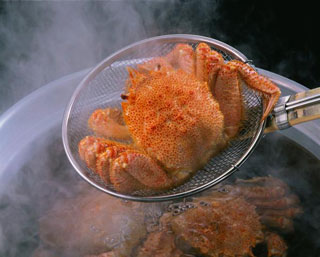
Karen Coates, blogging from Chiang Mai, wrote recently about how Southeast Asians try to avoid buying mainland Chinese produce because of their fear of pollution and pesticide contamination. Even within China, concern about food safety is growing. The newspapers are peppered with food-scare stories; last autumn, Taiwanese health officials found that exports of one of the most legendary Chinese delicacies, the hairy crab produced in Yangcheng Lake, were tainted with a carcinogenic antibiotic. When they go market-shopping, some of my Chinese friends look for leafy greens that are ragged with caterpillar bites: a sign, they think, that they have not been drenched in pesticides. Others try to eat less meat, for fear of added hormones. Everyone knows that the best eggs, chickens, and pork come from friends or relatives in the countryside who rear them themselves, feeding their stock with grain and household scraps rather than manufactured fodder. And there's growing demand for so-called green food products (lu se shi pin), like wild mushrooms and tea leaves grown on high mountains away from industrial pollution. But can you rely on the assurances given on packaging in China? Even in a democratic country like Britain, it's hard to trust what you read. In China, where the media is still state-controlled and corruption is widespread, it's virtually impossible. As I eat my way around China in the course of my research, I find my appetite is shrinking. In England, I seek out organic vegetables and drug-free meat; in China, I am faced with farmed fish and seafood, pork that may be hormone-fed, and vegetables I suspect of being laced with pesticides. And all of them are produced in a country where a tenth of farmland is seriously polluted and irrigation water in many areas is contaminated by industrial waste. The best meals, these days, are those in out-of-the-way places, when I dine on wild bamboo shoots and homegrown vegetables.



 Pinterest
Pinterest


